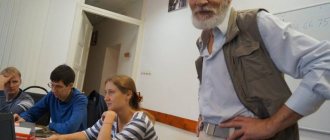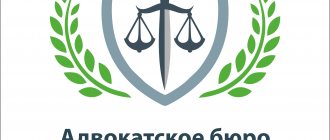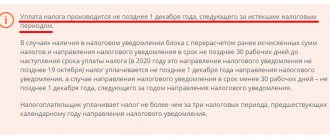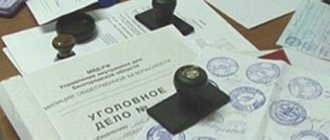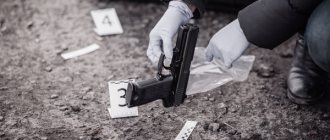1. Collection of evidence is carried out during criminal proceedings by the inquirer, investigator, prosecutor and the court through investigative and other procedural actions provided for by this Code.
2. The suspect, accused, as well as the victim, civil plaintiff, civil defendant and their representatives have the right to collect and present written documents and objects for inclusion in the criminal case as evidence.
3. The defender has the right to collect evidence by: 1) obtaining objects, documents and other information; 2) interviewing persons with their consent; 3) requesting certificates, characteristics, and other documents from state authorities, local governments, public associations and organizations that are obliged to provide the requested documents or copies thereof.
Everything about criminal cases
Go to the text of the Code of Criminal Procedure
Url Additional information:
Collecting evidence
- Part 1 86 Code of Criminal Procedure
collection is carried out by the prosecution and the court
Gathering by other participants
- Part 2 86 Code of Criminal Procedure
rights of other persons to collect evidence:
- Part 2 86 Code of Criminal Procedure
the accused has the right to collect evidence
- Part 2 86 Code of Criminal Procedure
the victim has the right to collect evidence
- Part 2 86 Code of Criminal Procedure
civil plaintiff - has the right to collect evidence
- Part 2 86 Code of Criminal Procedure
civil defendant - has the right to collect evidence
- Part 2 86 Code of Criminal Procedure
representatives (plaintiff and defendant) - have the right to collect evidence
Collection of evidence by the defense attorney
- Part 3 86 Code of Criminal Procedure
rights of the defense attorney to collect evidence:
— clause 1 part 3 86 Code of Criminal Procedure
the defender has the right to receive documents and objects
- clause 2, part 3 86 Code of Criminal Procedure
the defense attorney has the right to interview persons with their consent
- clause 3, part 3 86 Code of Criminal Procedure
The defender has the right to request certificates (lawyer's request)
Article 86 of the Code of Criminal Procedure. Collecting evidence
Url Additional information:
- clause 3.1
Plenum No. 1, the refusal to collect cannot be appealed under
Article 125 of the Code of Criminal Procedure
1) Collection of evidence is carried out during criminal proceedings by the investigator, investigator, prosecutor and the court through the following proceedings:
Url Additional information:
— Chapter 22
Criminal Procedure Code preliminary investigation
— investigative actions,
Url Additional information:
— clause 32 5 Code of Criminal Procedure
procedural action is an action provided for by the Code of Criminal Procedure
and other procedural actions provided for by the Criminal Procedure Code.
Url Additional information:
Right to present evidence
(normative base)
- clause 4, part 4 47 Code of Criminal Procedure
right of the accused to present evidence
- Part 2 86 Code of Criminal Procedure
rights of participants in the process to present evidence
- Part 2.2 159 Code of Criminal Procedure
evidence cannot be refused
— 286 Code of Criminal Procedure
introduction of new documents at the court hearing
— P.
Plenum No. 51 ensuring the rights of the parties to present evidence
Appealing a refusal
- clause 3.1
Plenum No. 1, refusal of evidence cannot be appealed under
Article 125 of the Code of Criminal Procedure
- Part 2 389.2 of the Code of Criminal Procedure
The court's refusal of a petition cannot be appealed until the final decision.
2) The right to collect and present written documents and objects for inclusion in a criminal case - as evidence:
- suspect, accused;
Url Additional information:
— clause 4 part 2 42 Code of Criminal Procedure
victim's right to present evidence
— clause 11
Plenum No. 17 assistance of the court to the victim in collecting evidence
- victim;
-
civil plaintiff;
-
civil defendant;
- and their representatives.
Url Additional information:
Rights of the defense attorney to collect evidence
- clause 2 part 1 53 Code of Criminal Procedure
defense lawyer's right to collect evidence
- Part 3 86 Code of Criminal Procedure
the defense attorney has the right to collect evidence
- Part 2.2 159 Code of Criminal Procedure
evidence cannot be refused
— Part 3 Article 6
N 63-FZ rights of a lawyer to collect evidence
3) The defender has the right to collect evidence by:
1). obtaining items, documents and other information;
Url Additional information:
- clause 2, part 3, art. 6
N 63-ФЗ the right of a lawyer to question witnesses
2). interviewing persons with their consent;
Url Additional information:
— Part 1 Article 6.1
N 63-FZ right to a lawyer’s request
Lawyer request
Selection of materials
at the request of a lawyer, Order dated 12/14/16
No. 288
3). requesting certificates, references, and other documents from government bodies, local governments, public associations and organizations,
Url Additional information:
— 5.39 Code of Administrative Offenses
liability for refusal of a lawyer's request
— who are obliged to provide the requested documents or copies thereof.
Return to the text of the Code of Criminal Procedure
Seek advice
Commentary on Article 86 of the Code of Criminal Procedure of the Russian Federation
1. The majority of proceduralists understand the collection of evidence as the search, discovery, receipt (extraction, demand) of information that may be relevant to the criminal case, as well as their consolidation in the provisions provided for in Part 2 of Art. 74 Code of Criminal Procedure sources <500> or any part of these actions. ——————————— <500> See, for example: Commentary on the Criminal Procedure Code of the Russian Federation / Rep. ed. IN AND. Radchenko; scientific ed. V.T. Tomin, M.P. Polyakov. M.: Yurayt-Izdat, 2004. P. 274; and etc.
2. When collecting evidence, information is subject to discovery. They are consolidated into sources of evidence. Taken together, this constitutes the process of collecting evidence. But in the course of this, activities are carried out aimed at discovering (obtaining) not evidence, but relevant information that could be dressed (“fixed”) in a form acceptable for criminal procedural proof. After such consolidation is completed, the proof appears.
3. The subjects whom the legislator has vested with the powers enshrined in Part 1 of the commented article include the investigator, the investigator, the head and member of the group of investigators, the head of the inquiry unit, the inquiry body, the head (member) of the investigative group, the head of the investigative body, the court and the judge. . The list of Part 1 of the commented article also includes the prosecutor. However, at present, the prosecutor does not carry out procedural actions aimed at collecting evidence.
4. The collection of evidence is carried out through the “production” of investigative and other procedural actions, says Part 1 of the commented article “Production” in this case refers to the procedure for carrying out actions and making interim decisions, which in their totality constitute the content of a specific investigative (judicial, other procedural ) actions.
5. Moreover, the procedure for conducting an investigative (judicial) action implies not only general requirements for collecting evidence, but also specific ones - separately for each action (inspection, seizure, etc.). An investigative action and its results will be illegal even if the requirements for carrying it out after the initiation of a criminal case are not met (with the exception of an inspection of the scene of the incident), a special resolution is not executed (incorrectly executed) (when required by law) or a protocol of the investigative (judicial) action. A detailed study by the law enforcement officer of the procedure, grounds and conditions for carrying out each and every investigative (judicial) action will help to avoid these errors.
6. The right to carry out investigative (judicial and other procedural) actions, which are discussed in Part 1 of the commented article, is granted only to investigators (inquirers, etc.). Suspects, accused persons, their defenders, victims, civil plaintiffs, civil defendants and their representatives do not have such a right. This follows directly from the structure and content of Art. 86 Code of Criminal Procedure of Russia.
7. The legislator has granted the investigator (inquiry officer, etc.) the right to carry out not only investigative (judicial) actions, but also other actions aimed at collecting evidence, but not being investigative actions. The latter differ from investigative actions, first of all, in that the procedure for carrying out investigative actions is regulated by the criminal procedural law, and the procedure for using any method of collecting evidence other than the investigative (judicial) action is not prescribed in the law.
8. It is precisely in connection with this circumstance that it seems incorrect to call such “procedural” actions. Indeed, a number of actions aimed at collecting evidence are specified in the Russian Code of Criminal Procedure. Meanwhile, an action becomes procedural not after its name is placed in the criminal procedure law (or, as written in paragraph 32 of Article 5 of the Code of Criminal Procedure, “provided for” by the Code of Criminal Procedure of Russia), but only after the procedure for its production will be regulated by this law. If the procedure for carrying out such an action were regulated by the Code of Criminal Procedure, it would immediately become an investigative action. That is why we cannot agree with P.A. Lupinskaya, who writes that the procedure for carrying out other procedural actions is “specified in the law” <501>. The conclusion suggests itself that all those actions that the legislator called “other procedural actions” in Part 1 of the commented article are not procedural. ——————————— <501> See: Criminal procedural law of the Russian Federation: Textbook / Rep. ed. P.A. Lupinskaya. M.: Yurist, 2003. P. 252.
9. The criminal procedure law regulates the procedure for conducting investigative (judicial) actions. All these are procedural actions. Only these procedural actions have a cognitive orientation. But they are not in Part 1 of Art. 86 of the Code of Criminal Procedure are called “other procedural actions”. “Other procedural actions” are methods of collecting evidence other than investigative (judicial) actions. These also exist. But they are all non-procedural.
10. They can be divided into two groups. The first group is actions provided for by the criminal procedure law. It is to them that the legislator draws attention in Part 1 of the commented article. The second group is methods (actions) not provided for by the criminal procedure law.
11. Among the means of collecting evidence provided for by the Code of Criminal Procedure, used by investigators (inquirers, etc.), some scientists consider only “requesting documents, as well as their inclusion in the case” <502>. However, this is not a complete list. A more complete list of actions that are not investigative (judicial), but provided for by the Criminal Procedure Code and have a cognitive orientation, is as follows: ———————————
Note:
Commentary on the Criminal Procedure Code of the Russian Federation (ed. I.L. Petrukhin) is included in the information bank according to the publication - Welby, Prospect, 2008 (6th edition, revised and expanded). <502> See: Commentary on the Criminal Procedure Code of the Russian Federation. M.: TK "Velby". P. 148.
— checking a report of a crime (Part 1 of Article 144 of the Code of Criminal Procedure of Russia);
— obtaining explanations (part 1 of article 144 of the Code of Criminal Procedure of Russia);
— demand for documents and objects (part 1 of article 144, article 286 of the Code of Criminal Procedure of Russia);
- the requirement to carry out documentary checks, audits, studies of documents, objects, corpses and to involve specialists in these actions (Part 1 of Article 144 of the Code of Criminal Procedure of Russia);
— requirement for the transfer of documents and (or) materials (part 2 of article 144 of the Code of Criminal Procedure of Russia);
— drawing up a protocol of an oral statement about a crime (Article 141 of the Code of Criminal Procedure of Russia);
— drawing up a protocol of confession (Article 142 of the Code of Criminal Procedure of Russia);
— requesting documents (Article 286 of the Code of Criminal Procedure of Russia);
- attaching objects that have signs of other documents to a criminal case (part 3 of article 84, part 2 of article 86, part 3 of article 235, part 2 of article 279, article 286 of the Code of Criminal Procedure of Russia);
- involvement of objects with signs of material evidence in criminal proceedings (Part 2 of Article 86 of the Code of Criminal Procedure of Russia), etc.
12. The non-procedural methods of collecting evidence provided for by the Code of Criminal Procedure occupy an intermediate place between investigative actions and other non-procedural (not even mentioned in the Code of Criminal Procedure of Russia) methods of collecting information related to a criminal case. Unlike investigative actions, in relation to the considered type of methods of collecting evidence, the legislator has regulated only the procedure for involving (but not searching and discovering) information with the property of relevance in the criminal process. Thus, the legislator has provided a simplified way of involving in the criminal process information identified outside the criminal process, but relevant to the case. The presence in the case of a request, a written demand and other documents recording the fact of verification of a report of a crime, as well as a protocol of presentation with reference to the relevant articles of the Code of Criminal Procedure, for example, of one or another document eliminates the need for additional investigative action in order to seize it and attach it to the criminal case (verification material).
13. In addition to the above, there are ways to collect information relevant to the case, which are not mentioned in the criminal procedure law. The latter, as a rule, are regulated by sources from other branches of law or are not legal at all. In order to involve objects and (or) documents obtained as a result of the use of such means (gathering information) into the criminal process, it is necessary to draw up a criminal procedural act confirming this fact of involvement. Usually this is a protocol of seizure, search, inspection (with seizure), etc. However, it cannot be considered a violation of the law to include the specified items and (or) documents in the criminal case (inspection material) and in the course of the procedure provided for in Part 1 of Art. 144 of the Code of Criminal Procedure of verifying a report of a crime, as well as by using other unregulated, but provided for by the Code of Criminal Procedure, means of collecting evidence.
14. Methods of collecting information not mentioned in the criminal procedure law include:
a) public operational-search activities;
b) public investigative actions, including the collection by a private detective of information on criminal cases on a contractual basis with the participants in the process (oral questioning of citizens and (or) officials (with their consent), making inquiries, studying objects and (or) documents (with written consent of their owners), external inspection of buildings, premises and (or) other objects, observation to obtain the necessary information) (clause 7, part 2, article 3 of the Law of the Russian Federation of March 11, 1992 N 2487-1 “On private detective and security activities in the Russian Federation" <503>); ——————————— <503> See: Gazette of the Council of People's Deputies and the Supreme Council of the Russian Federation. 1992. N 17. Art. 888.
c) forensic medical examination;
d) examination of persons suspected of committing an administrative offense regarding the presence of alcohol or drugs in the body (clause 14, part 1, article 13 of the Federal Law “On Police”);
e) examination of traces and (or) other objects;
f) administrative seizure of things and documents (Articles 27.1, 27.10 of the Administrative Code);
g) inspection (Articles 27.1, 27.7, 27.9 of the Administrative Code);
h) inspection of premises, territories and things and (or) documents located there that belong to a legal entity or individual entrepreneur (Articles 27.1, 27.8 of the Administrative Code);
i) the act of voluntary surrender of a narcotic drug, psychotropic substance, their analogues, plants containing narcotic drugs or psychotropic substances, or their parts containing narcotic drugs or psychotropic substances, firearms, their main parts, ammunition, explosives and explosive devices (Article Articles 222, 223, 228 of the Criminal Code).
15. The given range of non-procedural methods of collecting information is only approximate. It is not possible to provide an exhaustive list due to the variety of options and types of actions under consideration.
16. Let’s move on to the analysis of the content of Part 2 of the commented article. The list of subjects given here who have the right to collect evidence is not exhaustive. In addition to the persons indicated here, a private prosecutor (part 2 of article 43 of the Code of Criminal Procedure of Russia) and a legal representative (clause 6 of part 2 of article 426, clause 3 of 2 Article 437 Code of Criminal Procedure of the Russian Federation) <504>. ——————————— <504> In the future, for the sake of brevity, unless otherwise specifically stated, all entities covered by what is enshrined in Part 2 of Art. 86 of the Code of Criminal Procedure will be referred to as “suspect (victim, etc.).”
17. The right to collect and (or) present items (documents) related to the criminal case from the suspect (victim, etc.) is present throughout the entire criminal process. But this is not an obligation. Even such participants in criminal proceedings on the part of the prosecution as the victim (civil plaintiff) and his representative do not have such an obligation.
18. The suspect, accused, as well as the victim, civil plaintiff, civil defendant and (or) their representatives are vested with the right to collect and (or) present written documents and (or) objects related to the criminal case, but not evidence.
19. Therefore, even if he recognizes the need to collect and (or) present a document (item) to attach it to a criminal case as evidence, the final decision on carrying out any of these types of activities is made by him himself. And the legislator allows the suspect (victim, etc.), even in such a situation, to collect objects (documents), but not present them to the investigator (interrogating officer, etc.), and also, having the opportunity to collect objects (documents), to refuse to carry out this type of activity.
20. The law does not contain a list and, accordingly, rules for the suspect (victim, etc.) to carry out actions aimed at collecting, as well as presenting written documents and (or) objects for inclusion in the criminal case as evidence. Therefore, if, when a suspect (victim, etc.) collected documents (objects) to include them in a criminal case as evidence, the prohibitions established by law were not violated, this type of activity cannot be recognized as carried out in violation of the requirements of the Code of Criminal Procedure of Russia. After this, the relevant written document and (or) object received by the suspect (victim, etc.) must be involved in criminal proceedings in the manner prescribed by the Code of Criminal Procedure of Russia. The involvement of such a document (subject) can be carried out in at least three ways:
- in accordance with the proposed Part 2 of Art. 86 of the Criminal Procedure Code of receipt of a document (item) presented for inclusion in a criminal case as evidence;
— in the process of conducting an investigative (judicial) action;
— by implementing the non-procedural methods of collecting evidence provided for by the Code of Criminal Procedure (Part 1 of Article 86 of the Code of Criminal Procedure of Russia).
21. The presentation of documents (objects) for inclusion in a criminal case as evidence can be carried out in any forms not prohibited by law. This can be either transfer or delivery, sending the above items (documents) to the investigator (interrogating officer, etc.). The legislator has not determined whether a document is drawn up confirming the fact of receipt of the presented item (document). Accordingly, if one has not been drawn up, it cannot be recognized that the representation was made in violation of the requirements of the Code of Criminal Procedure of Russia. Meanwhile, we recommend that you still draw up a procedural document according to rules similar to the procedure for recording an investigative action, where you record the fact, progress and results of receiving the object (document) presented by the suspect (victim, etc.).
22. The presence of the suspect (victim, etc.) of the right to present objects and (or) documents for their inclusion in the criminal case as evidence implies the imposition on the investigator (inquiry officer, etc.) of the obligation to receive them specifically for their inclusion in the criminal case as evidence. If the investigator (inquirer, etc.) has the obligation to receive an object to attach it to the criminal case as evidence, then consistently state that he is also entrusted with the obligation to carry out the specified activity (to attach the presented object to the criminal case as evidence).
23. The inclusion of such in a criminal case is carried out in different ways, depending on the characteristics of what type of evidence the presented thing has. Objects that have signs of another document are added to the criminal case in one stage, and material evidence - in two. Moreover, the first stage of attaching objects (documents) with signs of material evidence to a criminal case is similar to the procedure for attaching objects with signs of other documents.
24. First, activities are carried out to involve in the criminal process an object and (or) document that reflects information related to the criminal case. It can be carried out, at least, by obtaining this object, presented in accordance with Part 2 of Art. 86 of the Code of Criminal Procedure, investigative actions (seizure, search, inspection, etc.) and (or) other means of collecting evidence specified in the Code of Criminal Procedure.
25. If the carrier of information related to the criminal case had the signs of another document, then the process of involvement itself is its inclusion in the criminal case. After this, evidence appears in a criminal case - another document. When the object (document) had the characteristics of material evidence, after being involved in the criminal process, it is not yet considered to be fully included in the criminal case. In order for it to become material evidence, it must go through the second stage of attaching it to the criminal case. This second stage consists of two elements:
— inspection and, if possible, photographing of this carrier of evidentiary information;
- issuing a special resolution to recognize it as material evidence and attach it to the criminal case. This resolution resolves the issue of leaving material evidence in a criminal case or depositing it with the owner or other persons or organizations.
26. Only after the procedural registration of the above investigative protocol and resolution, a specific object, for example, a knife or a passport, will be considered included in the criminal case as material evidence.
27. Since at the time of the beginning of the specified “second stage” there is already evidence in the criminal case, the period under consideration should be consistently isolated as an independent element of the process of proof. We recommend that the analyzed part of the evidence be called consolidation of evidence <505>. Similar proposals came from other proceduralists <506>. Meanwhile, we are forced to admit that many proceduralists attribute the actions that make up this stage of proof entirely to an element of the content of the process of proof, called collecting evidence <507>. ——————————— <505> See: Ryzhakov A.P. Course of criminal procedure (structural and logical diagrams): Proc. allowance. M.: Legal. , Infra-M, 2001. P. 150; etc. In subsequent textbooks (short courses in criminal procedure) I did not indicate the presence of such an element (consolidation of evidence) of the process of proof (see, for example: Ryzhakov A.P. Criminal procedure: Textbook for universities. 3rd ed., Revised M.: Norma, 2004. pp. 223 - 233). I did this intentionally. In my opinion, the educational literature where I touched on the issue of the content of the process of proof had the goal of presenting the most common approach to this procedural institution. That's what I tried to do. Silencing the issue of the existence of an independent element of the proof process, which is the consolidation of evidence, was intended to protect students from possible additional and, moreover, difficult questions from teachers.
Note:
Commentary on the Criminal Procedure Code of the Russian Federation B.T. Bezlepkina is included in the information bank according to the publication - Prospect, 2012 (11th edition, revised and expanded). <506> See, for example: Bezlepkin B.T. Commentary on the Criminal Procedure Code. P. 121; and etc.
Note:
Commentary on the Criminal Procedure Code of the Russian Federation (ed. I.L. Petrukhin) is included in the information bank according to the publication - Welby, Prospect, 2008 (6th edition, revised and expanded). <507> You come to this conclusion from an analysis of the following works. See: Commentary on the Criminal Procedure Code of the Russian Federation. M.: TK "Velby". P. 148; and etc.
28. Analysis of the content of part 3 of the commented article allows us to draw the following conclusions. In reality, the defender can only collect other documents. The involvement of objects (documents) with signs of physical evidence in criminal procedural evidence presupposes their mandatory subsequent inspection, as well as the issuance of a resolution by the investigator (inquiry officer, etc.) to recognize them as material evidence and attach them to the criminal case. But the defender has no right to do these actions. This is the authority of the investigator (interrogating officer, etc.). In other words, part 3 of the commented article gives the defender the right to both collect evidence and collect and (or) present documents and (or) objects for inclusion in the criminal case as evidence <508>. ——————————— <508> In what follows, for brevity, unless otherwise specifically stated, the two named types of activity will be referred to here as collecting evidence.
29. It is recommended to formalize the receipt of objects related to the criminal case, which are discussed in paragraph 1 of part 3 of the commented article, with a written document similar in form to the seizure protocol. The same recommendation can be extended to documents that could record the facts of the defender’s use of the powers granted to him in paragraphs 2 and 3 of part 3 of the commented article. In the document being compiled, after reflecting the explanations of the person being interviewed, sequentially make, for example, the following entry: “The interviewee, in the process of giving an explanation, presented a knife found on his summer cottage.”
30. It is recommended to record the receipt of information (interviewing persons with their consent) in a written document, which is drawn up in a similar manner to the interrogation protocol. By analogy with clause 2, part 2, art. 75 of the Code of Criminal Procedure, the information provided to the interviewee should not be based on conjecture, assumption, or rumor. The interviewee should be able to indicate the source of his knowledge.
31. However, it should be borne in mind that the information obtained by the defense lawyer differs from the testimony of the witness given during interrogation. Their differences are as follows:
1) the person being questioned by the defense attorney is not obliged to answer the questions put to him;
2) information from the interviewee must be obtained at his location (residence, work), in other words, he cannot be summoned anywhere for these purposes (by subpoena or other means);
3) the person being interviewed cannot be brought into custody;
4) the person who provides the defense attorney with information related to the criminal case is not warned of liability for knowingly giving false testimony and for refusing to give testimony.
32. At the same time, during an interview, a person is given the right to speak his native language, become familiar with the content of the explanation, and attest to its correctness. It is recommended that the defense attorney interview young eyewitnesses in the presence of a teacher (parents). Just as during interrogation, during questioning, the suspect (victim, etc.) has the right to present evidence in accordance with Part 2 of the commented article. But not only from the suspect (victim, etc.), the defense attorney has the right to obtain objects (documents) and (or) other information . The legislator has not limited the circle of persons through communication with whom the authority granted to the defender in clause 1, part 3 of the commented article can be exercised.
In judicial practice, the interview protocol drawn up by the defense attorney is examined as evidence equivalent to other evidence <509>. ——————————— <509> See: Review of judicial practice of the Supreme Court of the Russian Federation “Review of cassation practice of the Judicial Collegium on criminal cases of the Supreme Court of the Russian Federation for 2008” // Bulletin of the Supreme Court of the Russian Federation. 2009. N 7.
33. Clause 3 of part 3 of the commented article gave the defender the right to request certificates, characteristics, and other documents from state authorities, local governments, public associations and organizations that are obliged to provide the requested documents or copies thereof. The legislator here, in contrast to paragraph 1 of the same part, speaks of requisition, and not of receipt. Accordingly, it is assumed that this power of the defender can be ensured by state coercion.
34. It is recommended to formalize the fact of the demand with a request with reference to the relevant article of the Code of Criminal Procedure and the fact of the defense of the suspect (accused) in a specific criminal case. However, any other written forms of confirming the fact of the claim are also possible. These include:
1) protocol of claim;
2) a decree on the claim;
3) the defense attorney’s explanation about his taking copies of documents, etc.
35. Just as in the case of obtaining objects and documents, it is recommended to reclaim them by drawing up a claim protocol taking into account and by analogy with the rules for the production (recording) of seizure.
36. Part 3 of the commented article was poorly formulated by the legislator. Familiarization with its contents may lead to the idea that the defense attorney is given the right to request documents not from any of the specified bodies (institutions), but only from those “who are obliged to provide the requested documents or their copies.”
37. Meanwhile, it seems that with this rule of law the legislator wanted to say something different. Namely, what is indicated in clause 1, part 3, art. 6 of the Federal Law “On advocacy and the legal profession in the Russian Federation.” It is noted here that a lawyer has the right to collect information necessary to provide legal assistance, including requesting certificates, references and other documents from state authorities, local governments, public associations, and other organizations. The specified bodies and organizations are obliged, in the manner established by law, to provide the lawyer with the documents requested by him or their certified copies no later than one month from the date of receipt of the lawyer’s request.
38. Since in most cases the defense lawyer in criminal proceedings is a lawyer, it can be assumed that the end of paragraph 3 of part 3 of the commented article does not limit the range of institutions from which documents can be requested by the defense lawyer, but, on the contrary, imposes on the latter the obligation to provide the defense lawyer requested documents or copies thereof.
39. See also commentary to Art. Art. 5, 84, as well as to all other articles of the Code of Criminal Procedure <510> mentioned here. ——————————— <510> For a more complete commentary on this article, see: Ryzhakov A.P. Collection of evidence in Russian criminal proceedings. Commentary to Art. 86 Code of Criminal Procedure of Russia. M., 2004; Ryzhakov A.P. Collection (verification) of evidence. Testimony as a means of proof: Scientific and practical guide. M.: Exam, 2007.
40. On the meaning of the concept of “procedural action”, see the commentary to Art. 49 Code of Criminal Procedure of Russia.
41. See also commentary to Art. 244 Code of Criminal Procedure of Russia.
Some problems in the theory of collecting evidence by a defense attorney in criminal proceedings
The problem of collecting evidence in criminal proceedings by a defense lawyer at the stage of preliminary investigation and judicial investigation has been discussed by domestic lawyers for quite some time. Currently, there are different points of view on this problem. The purpose of my research: through legal analysis of Russian and foreign legislation, as well as various points of view of scientists and legal practitioners on the stated problem, to develop proposals and recommendations aimed at eliminating it.
The first thing I would like to draw your attention to is that in Part 3 of Art. 123 of the Constitution of the Russian Federation declares that legal proceedings are carried out on the basis of competition and equality of the parties. Criminal proceedings are also based on this principle in Art. 15 Code of Criminal Procedure of the Russian Federation. At the same time, according to A.V. Piyuk, the modern criminal process in Russia is mixed, not adversarial, which excludes the possibility of the defense attorney becoming a subject of independent collection of evidence at the stage of preliminary investigation of a criminal case[1]. And, according to Yu. A. Lyakhov, “the main direction for improving the Russian criminal process is to develop the constitutional principle of adversarialism, and not to curtail it. There is still a lot to be done to fully implement it in our criminal proceedings, to ensure the equality of rights of participants in criminal proceedings that is organically associated with it [2].”
With the naked eye one can see an obvious contradiction: in theory, the principle of adversarial and equal rights in criminal proceedings is just a declaration, and in practice there is a process of “winding down” this principle.
Further, I would like to note that there is no legislative concept of “collection of evidence”. One has only to guess through interpretation what the legislator meant, and this leads to obvious contradictions and problems. For example, in Art. 74 of the Code of Criminal Procedure of the Russian Federation defines evidence as any information on the basis of which the court, prosecutor, investigator, inquirer establishes the presence or absence of circumstances during criminal proceedings, as well as other circumstances relevant to the criminal case. But in Part 3 of Art. 86 of the Code of Criminal Procedure of the Russian Federation states that the defense lawyer has the right to collect evidence by:
1) receiving items, documents and other information;
2) interviewing persons with their consent;
3) requesting certificates, characteristics, and other documents from state authorities, local governments, public associations and organizations that are obliged to provide the requested documents or copies thereof.
From the definition of evidence it follows that the defense attorney is not among the persons who have the right to establish circumstances relevant to the criminal case, because there is no sign of admissibility of the information listed in Part 3 of Art. 86 Code of Criminal Procedure of the Russian Federation. In my opinion, the defense lawyer has the right to collect information, and this concept is disclosed in Art. 2 of the Federal Law of July 27, 2006 No. 149-FZ “On Information, Information Technologies and Information Protection” as information (messages, data) regardless of the form of their presentation. In other words, the defense lawyer does not collect evidence (if he judges according to the definition of evidence given in Article 74 of the Code of Criminal Procedure of the Russian Federation), but collects information, because the defense lawyer does not have the right to give information relevant to the criminal case the status of evidence possesses.
Another problem is that the right of the defense lawyer to collect evidence is declared, but not ensured. There are no tools for applying this right, which is a gap in the current Code of Criminal Procedure of the Russian Federation. Everything is left to the will of the preliminary investigation authorities, the prosecutor and the judge, which can lead to abuses by the prosecution and violation of the Constitutional rights of citizens. In the Republic of Kazakhstan, for example, such gaps in the legislation have been eliminated, and a lawyer is given greater rights in criminal proceedings than his colleagues in Russia. Article 70 of the Code of Criminal Procedure of the Republic of Kazakhstan dated July 4, 2014 No. 231-V (as amended and supplemented as of November 7, 2014)[3] speaks of these powers:
− collect and present objects, documents, information, as well as other data necessary for the provision of legal assistance, which are subject to mandatory inclusion in the materials of the criminal case (according to the Code of Criminal Procedure of the Russian Federation, a lawyer can only petition for this before the inquirer, investigator, prosecutor and court, and the decision this petition is accepted at their discretion);
− get acquainted with the protocol of the court session, and have the right to put their signatures at the end of the protocol, and when familiarizing themselves with part of the record of the court session, put their signatures at the end of this part, and make comments on it;
− petition the investigating judge to deposit the testimony of the witness and the victim;
− petition for the forced bringing to the body conducting the criminal trial of a previously interviewed witness, whose appearance to testify is difficult to ensure (in the Code of Criminal Procedure of the Russian Federation, the investigating judge is not present as a participant in the criminal trial, and the institution of deposition of testimony is not provided);
− petition the investigating judge to request any information, documents, items necessary to provide qualified legal assistance and protect the interests of the suspect, accused, witness entitled to protection, with the exception of information constituting state secrets, in cases of refusal to execute the request or non-acceptance decisions on it within three days;
− petition the investigating judge to order an examination if the criminal prosecution body unreasonably refused to satisfy such a petition or did not make a decision on it within three days;
− receive on a contractual basis the opinions of an expert, a specialist in the case and apply for the inclusion of such opinions in the case materials and other powers that Russian lawyers do not have.
Moreover, Russian scientists express different opinions of scientists about the status of the defense attorney in criminal procedural evidence during pre-trial proceedings. According to P.A. Lupinskaya, the defense lawyer is not an equal subject of collecting evidence to the inquirer, investigator and the court, which makes the very use of the term “gathering evidence” in relation to the accused and his defense lawyer very conditional [4]. A. Davletov, L. Yusupova o[5]. According to Vasyaev A.A., “today, the Code of Criminal Procedure of the Russian Federation provides the lawyer with the opportunity for active defense and manifestation of ingenuity in forming the internal conviction of the court. This position of the legislator establishes the right of a lawyer to present evidence without collecting it in a different sense, different from what the Code of Criminal Procedure of the Russian Federation defines for the collection of evidence by an investigator, interrogator, prosecutor, or court[6].”
The following conclusion is obtained that the defense lawyer does not collect evidence, as stated in Part 3 of Art. 86 of the Code of Criminal Procedure of the Russian Federation, but collects information that may or may not become evidence in the future, since there is no equality of status between the prosecution and the defense. This clearly contradicts the principle of adversarial and equal rights in criminal proceedings, because it is clear that the defense lawyer is dependent on the decision of the preliminary investigation bodies and the court when assigning the information received by the lawyer to the status of evidence, which affects the course of the case and the fate of the client.
To eliminate this dependence in science, many scientists [7] propose to amend the Code of Criminal Procedure of the Russian Federation regarding the recording of information received by the defense lawyer, because this is also a gap. The procedural activities of the preliminary investigation bodies to discover and record evidence are clearly defined by law, which undoubtedly serves as a guarantee of obtaining high-quality and reliable information on a criminal case, in contrast to the information that was discovered by the defense lawyer. That is why it is necessary to create means for the lawyer-defender to record evidence (a protocol of interviewing a person, procedural registration of providing the lawyer-defender with objects, documents and other information with the help of witnesses and a protocol, etc.), which would be equal under the law to the procedural means of recording evidence by the preliminary investigation bodies . Unfortunately, the legislator is not taking any measures to implement these provisions.
From the analysis of legislation and the scientific works we analyzed, we will formulate our own point of view on this problem - namely, since the defense function in criminal proceedings is entrusted to the shoulders of the lawyer, then, as practice shows, today’s guarantees to ensure the lawyer’s activities in collecting evidence are not enough to provide the most qualified assistance, since there is no equality of status between the prosecution and the defense. As a result, first of all, the suspect/accused suffers because his constitutional right to receive qualified legal assistance is violated (Part 1 of Article 48 of the Constitution of the Russian Federation). The constitutional principle of competition and equality of defense and prosecution is also declared and not ensured, which is unacceptable for a democratic society. Therefore, the problems that have been brewing for years in the criminal procedural legislation in this matter indicate that it is necessary to reform the Code of Criminal Procedure of the Russian Federation in accordance with the needs of our time.
[1] Collection of evidence by a defense attorney—declaration or reality? (Piyuk A.V.) (“Russian Justice”, 2010, No. 3) // SPS “ConsultantPlus”
[2] The constitutional principle of adversarial criminal proceedings and individual rights (Lyakhov Yu.A.) (“Russian Justice”, 2014, No. 3) // SPS “ConsultantPlus”
[3] https://online.zakon.kz/Document/
[4] Lupinskaya P.A. Review on Sat. scientific Art. “Protection of individual rights in criminal law and procedure” / Ed. ON THE. Lopashenko, S.A. Shafer. Saratov, 2003. Issue. 2 // Legal policy and legal life. 2004. N 4. P. 206.
[5] Davletov A., Yusupova L. The powers of the defense attorney to collect evidence in the modern model of criminal proceedings in Russia // Criminal Law. 2009. N 3. P. 80.
[6] Presentation of evidence without collecting it is the right of the defender (Vasyaev A.A.) (“Modern Law”, 2011, No. 1) // ATP “ConsultantPlus”
[7] Yaselskaya V.V. Methods for the defense attorney to collect evidence at the stage of preliminary investigation (“Bulletin of Tomsk State University 2003, No. 279”) // SPS “ConsultantPlus”

